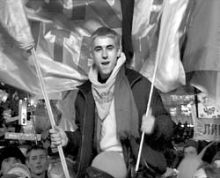Revolutions are made by sincere people. Perhaps unlike their masterminds, those who carry out revolutions are ordinary and believing people. Today we look back on the Orange Revolution as something festive and sincere in our largely insincere country. Today we, much like the French two centuries ago, can proudly address one another as “citizens.”
Revolutions are impossible without the heroes who make them and without the individuals who can capture them on film and preserve them for posterity. The first to bring to the public the truth about the revolutionary events of the past year were the Ukrainian Filmmaking Development Fund, the OlekStudio, and the Canadian corporation NAIPEC, whose documentary Ukraine — Breakthrough t o Democracy, directed by Liudmyla Nemyria, photography by Andriy Liubchenko, Serhiy Nozhechkin, and Oleksandr Tymenko, premiered recently at Kyiv’s Ukrayina cinema. Like a step-by-step computer strategy game, it provides a detailed account of the Ukrainians’ path to democracy. The shooting of the film began on the first day of the revolution, but it also zeroes in on all the headline-making events of the presidential race, beginning with Yushchenko’s announcement on Kyiv’s Spivoche Pole of his intention to run for president. The filmmakers reconstructed the most notorious events of the past year: the shadowing of Yushchenko in the Crimea, roads blocked with trucks, Yushchenko’s poisoning with dioxin, Kivalov’s memorable statements, and the verbal gaffes of the pro- government presidential nominee, etc. The documentary moves from the tumult and emotions of Independence Square to rumors of the Russian special services, the siege of the government buildings, flowers in the shields of the riot police, and the inauguration of the president elect. The off-screen narration alternates with commentaries by the protagonists of the Orange Revolution: Petro Poroshenko, Mykola Tomenko, Yuliya Tymoshenko, et al. The authors tried to shed light on the backstage dealings of the previous government, without providing explanations from the latter’s representatives. The former president’s role was mostly encapsulated in the phrase: “Leonid Kuchma is keeping silent.”
The film evoked a mixed response. Ukraine — Breakthrough to Democracy feels like an anthology that I had to read in high school, but one of those Soviet-period anthologies that didn’t have any works by Vasyl Stus and Vasyl Symonenko in the chapter on 20th century Ukrainian literature. While revolutions are made by sincere people, history books, as a rule, are not. The documentary appears to be tolerant and true to the best traditions of classic reporting, rich in facts, and free of demagoguery. However, the vanquished side is poorly represented. In the film it is presented as a white-and-blue sky, the kind we used to paint in childhood as a background to the bright-orange sun with rays that fill the entire drawing. Maybe the “breakthrough to democracy” really looks like that. But this is a subjective opinion.
Before it premiered at the Ukrayina cinema, the documentary was screened at one of the metropolitan clubs. Some of the film’s main characters were present for the screening. National Defense and Security Council Secretary Petro Poroshenko thanked the people of Ukraine for the miracle that they created and stressed that many of the current leaders have the photo of revolutionary Independence Square instead of the president’s photo in their offices as a reminder of those for whom all of this was done. Minister for Emergency Management Davyd Zhvaniya also took the floor: “We have been government officials for two months already. Thank you for reminding us about these events. It evokes many emotions and is a great stimulus for us not to become dry officials.” Let us hope they are sincere about this.







